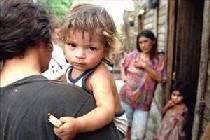IMF says pro-market policies are better to fight poverty in Argentina
The South American nation has made some social progresses since the economic collapse of 2002

Argentina announced this week slow progresses in the battle against widespread poverty, the painful legacy of a decade of pro-market policies that led to a painful economic collapse over three years ago. According to a government report, 38.5 per cent of the population, or 15 million people, still lives in poverty, some 20 per cent less than in the peak of the crisis.
No one doubts in this once wealthy and prosperous country that Argentina’s main problem is the fight against poverty and the creation of jobs to reduce unemployment. However, the International Monetary Fund (IMF) thinks rather differently. According to press reports, the head of this multilateral organization based in Washington, Rodrigo Rato, said that Buenos Aires should reduce credit and freeze salaries in order to crash a timid increasing on inflation rates.
The bureaucrats at the IMF say that in order to come out of the crisis, Argentina should implement the same pro-market measures that sink it in 2001. It is not clear how this impoverished nation that used to enjoy the best welfare state system in the region could return to normality following the advice of the IMF.
Fortunately, the IMF in Argentina is as unpopular as US President Bush in New Orleans after Katrina. Argentine leader Nestor Kirchner slams the bureaucrats in Washington as much as he can, as shows unprecedented levels of economic growth (9 per cent, last year), without even listening to Rato’s boys.
However, despite Kirchner's rhetoric, Argentina has been regularly paying its obligations to the IMF, even after it declared a default on its foreign debt in January 2002. Now, Argentina is back in the world of finances again and can fund its economic growth in the private market.
But the question is how the economic growth could ease the desperate situation of millions living in poverty. In an unequal region, Argentina a country that exports food to feed 300 million cannot feed its own population.
Clearly, regressive policies fuelled by the IMF will not reduce the gap between the rich and the poor, but apparently the good performance of the economy is far from being effective by its own means. The Argentine crisis calls for the creation of jobs and the redistribution of incomes to reduce poverty, but the government is neither ready to propose a tax reform nor an aggressive program to reduce unemployment.
It looks like Mr. Kirchner only trusts in his good fortune and the continuity of the good macroeconomic indicators. Pro-market policies will not help Argentina to become an equal society again, but rhetoric won't do that job.
Subscribe to Pravda.Ru Telegram channel, Facebook, RSS!




